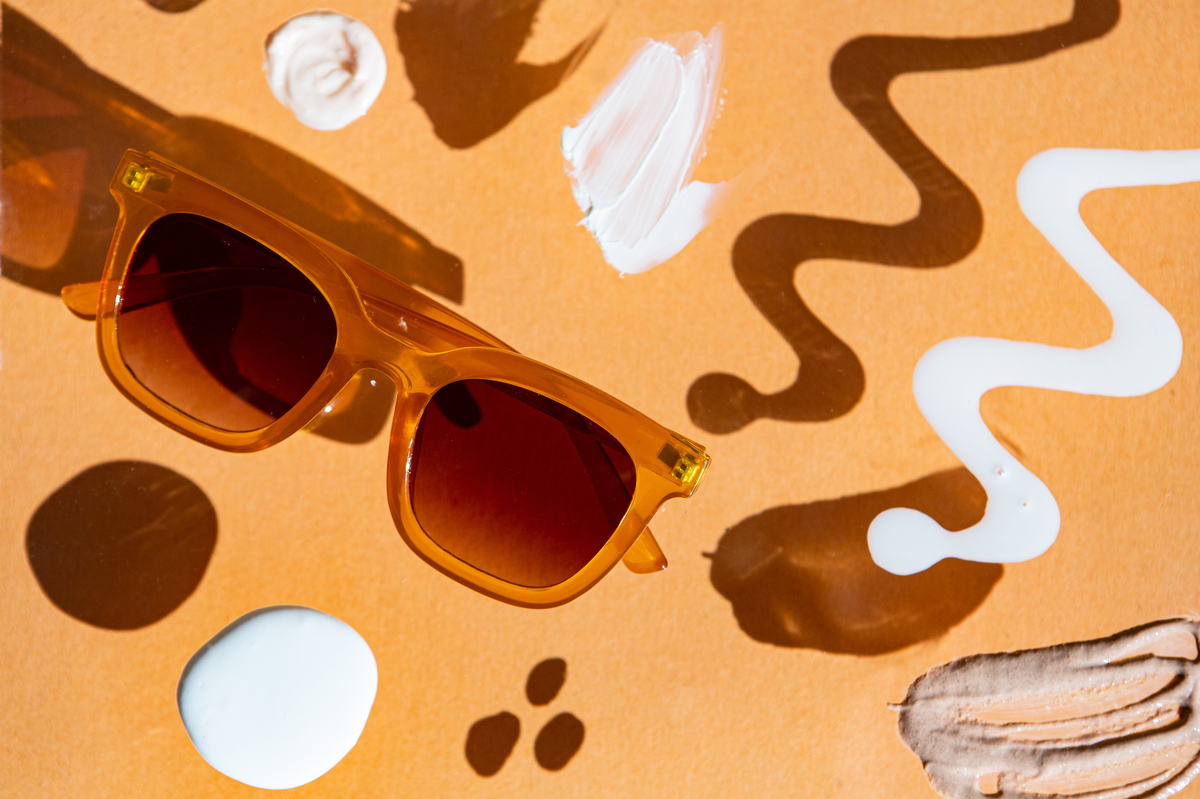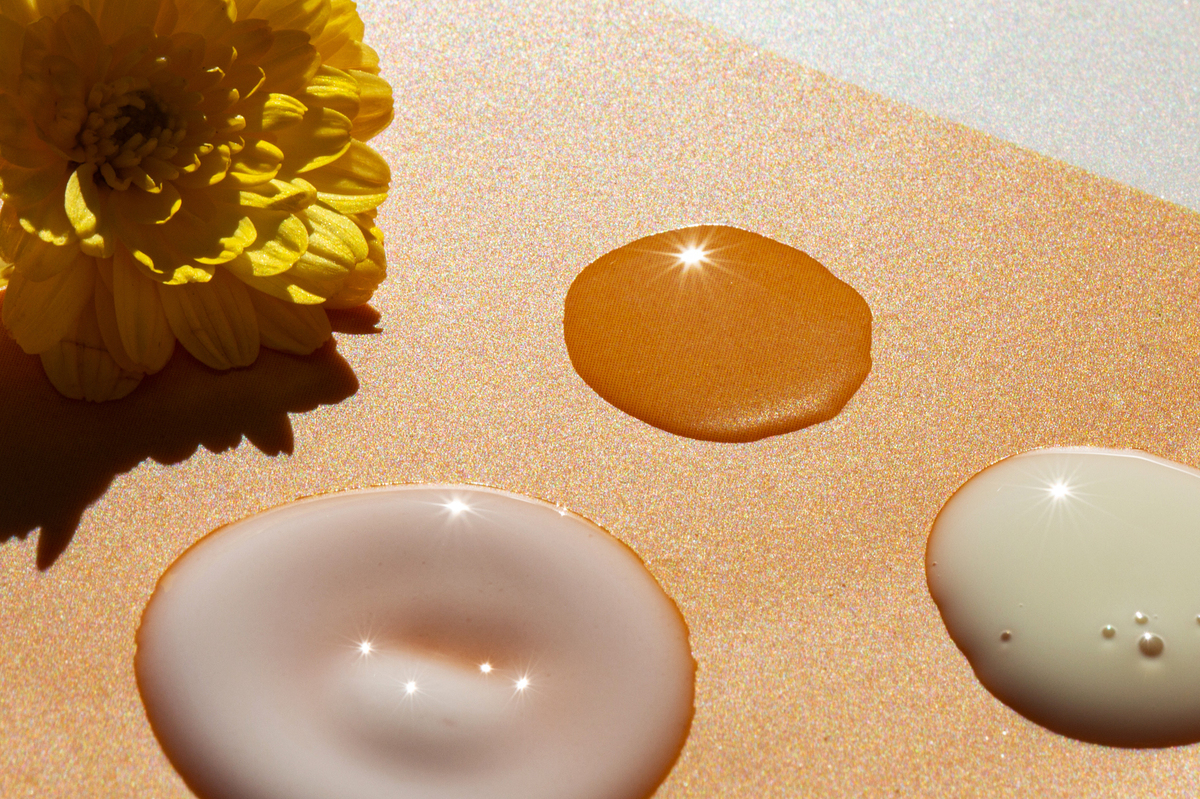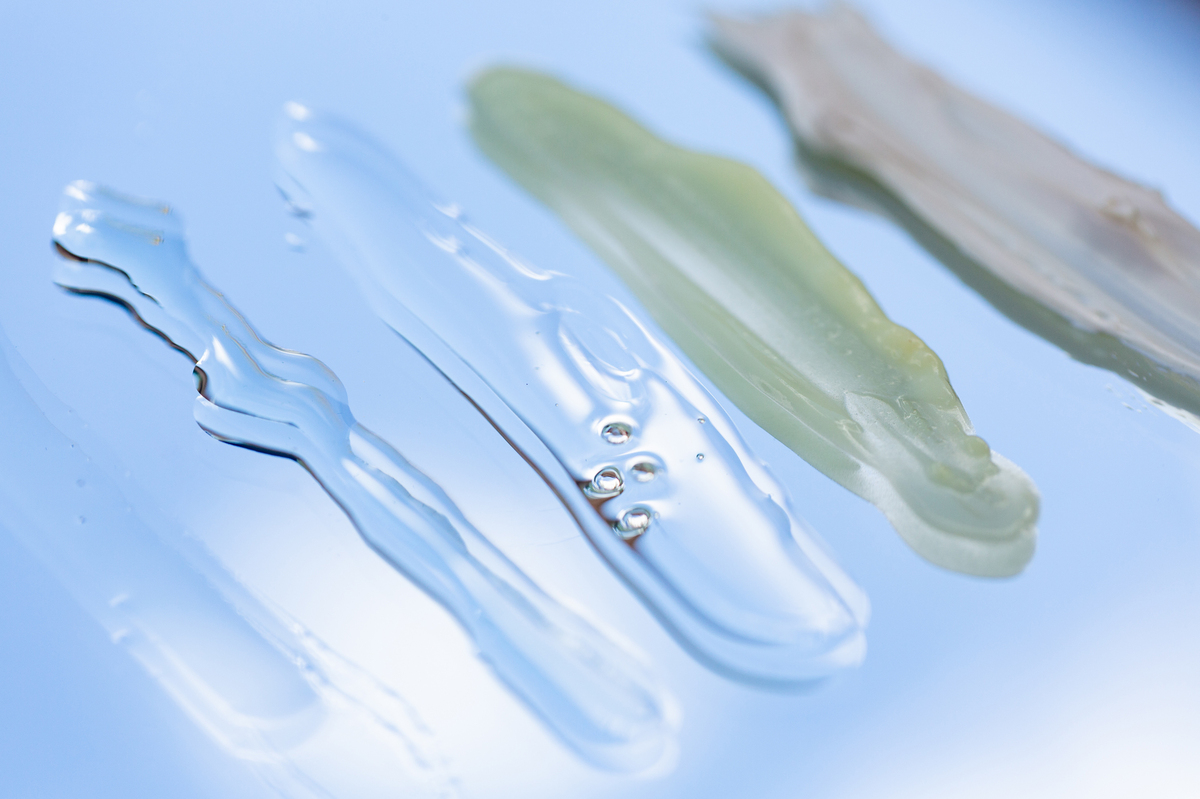
Photo Illustration by Becky Harlan/NPR

Photo Illustration by Becky Harlan/NPR
Skin care and cosmetics are such a big business that globally, consumers have doubled their spending on beauty products in the past 15 years, according to the consumer research company Euromonitor International.
It’s hard to miss. Our visual culture abounds with images of glowy, flawless skin whether it’s on celebrities, social media influencers or those pillars of perfect skin — your friends’ babies.
But when the quest for “good skin” combines with the non-stop marketing on the modern internet, the results can feel daunting — like you need a chemistry degree to understand all the ingredients and formulations. An endless series of how-tos, a parade of products to choose from, dermatology terms thrown about on TikTok … it just feels like a lot.
“The idea that more is more when it comes to your skin care routine is absolutely not the case,” says Rio Viera-Newton, a skin care book author, beauty blogger for New York magazine and a newly-licensed esthetician.
But skin shouldn’t be ignored, either. Dermatologists are the first to make the case that caring for skin matters for overall wellness.
“We have doctors that focus on the GI system, the heart, the skin, but it’s all connected. And we really need to be looking at patients more holistically because the skin is connected to the whole body,” says North Carolina-based dermatologist Dr. Muneeb Shah.
Take care of the skin you’re in to prevent sun damage, premature aging and cancer. You can even get that glowy-looking radiance for all that time we spend in front of our screens. Do it with these takeaways from the experts.
We should note, these tips aren’t a substitute for medical advice. Consult your dermatologist if there’s something worrying you about your skin.
Protect your skin against UV rays from the sun. Wear sunscreen

Photo Illustration by Becky Harlan/NPR

Photo Illustration by Becky Harlan/NPR
Across the board, every skin specialist we spoke to emphasized sun protection as the most important consideration for healthy skin. “A lot of people are curious about what sunscreens are right for them. Truly, the answer is whichever one makes you want to apply it every day,” says Viera-Newton.

Chicago-based Dr. Caroline Robinson, a board-certified dermatologist specializing in ethnic skin care and preventative skin care, underscores that applying sunscreen every day is a must, no matter how much melanin is in your skin.
“That’s a huge issue in communities of color just because of all the misconceptions about, you know, sunscreen use and whether we need it or not and are we at risk of skin cancer. And so I feel like a lot of my job is educating my friends, but also my patients about that. Yes, we are at risk. And yes, we do need sunscreen,” Robinson says.
Know your skin type and your goals

Knowing your skin care goal, for example to treat sun damage or dark spots, can help you figure out your game plan. For instance, to try Vitamin C.
Photo Illustration by Becky Harlan/NPR
hide caption
toggle caption
Photo Illustration by Becky Harlan/NPR

Knowing your skin care goal, for example to treat sun damage or dark spots, can help you figure out your game plan. For instance, to try Vitamin C.
Photo Illustration by Becky Harlan/NPR
Skin falls in a few general buckets: dry, oily, combination or “normal,” which is neither dry nor oily. Patients wind up at the dermatologist for various situations that might need medical intervention. But short of that, having a skin care goal helps clarify what treatment you need.
The goal might be to clear up acne. Or to prevent further signs of aging. Or to keep skin from getting too dry and itchy in the winter.
“A lot of people don’t identify those [goals] when they start a skin care routine and they end up buying a lot of products that don’t work well for them,” Shah says.
When building or editing a routine, remember the three pillars: cleanse, treat, protect

Vitamin C suspension, hyaluronic acid, and retinoids are all examples of “active” ingredients in skin care products.
Photo Illustration by Becky Harlan/NPR
hide caption
toggle caption
Photo Illustration by Becky Harlan/NPR

Vitamin C suspension, hyaluronic acid, and retinoids are all examples of “active” ingredients in skin care products.
Photo Illustration by Becky Harlan/NPR
That’s the way you create a starter skin care routine for yourself with only three steps. Cleanser is for washing your face, of course. Protection is sunscreen. And treat? … That can include a lot. Moisturizing falls under treating, and so do “actives,” short for active ingredients that target your specific skin concerns.
“When I say ‘active’ I really mean the ingredients that are doing the heavy lifting. So they may not necessarily be considered active ingredients by the FDA standard, but they’re the ones that are targeting a specific issue,” Shah says.

Examples of active ingredients that dermatologists really like these days are retinoids (for unclogging pores, getting rid of dead skin cells, addressing texture and dealing with fine lines and wrinkles), antioxidants (Vitamin C is an example, which helps to repair past sun damage and dark spots), and humectants, which hydrate. There are a lot of them, but one popular one these days is hyaluronic acid.
“The benefits [of hyaluronic acid] are that it can pull water from the air and from your environment and draw it into the skin, which can help plump address fine lines and wrinkles and hydrate the skin,” Robinson says.
Don’t want to get bogged down in all the names of specific ingredients and their categories? There’s no need to remember all this, just get back to your goals. What do you want to treat? Then figure out what “actives” will help get you there.
Order of application matters

A rule of thumb for skin care product application is to apply products from thinnest to thickest.
Photo Illustration by Becky Harlan/NPR
hide caption
toggle caption
Photo Illustration by Becky Harlan/NPR

A rule of thumb for skin care product application is to apply products from thinnest to thickest.
Photo Illustration by Becky Harlan/NPR
A simple hack for the order you apply your products is thinnest to thickest. “It is a really great rule of thumb to go by,” Viera-Newton says.
For example, a toner is thinner than a moisturizing lotion, which is thinner than a real thick night cream. So if you’re confused about the order of operation, thinnest to thickest is reliable enough until you get into advanced-level skin care routines.
To simplify, look for products that combine active ingredients

Photo Illustration by Becky Harlan/NPR

Photo Illustration by Becky Harlan/NPR
Look for ways to pack more into your routine by finding MVP products that *combine* active ingredients. Two-in-one products save time and money. Many cleansers have actives in them to help treat acne or other areas you consider problems.
“Let’s have a sunscreen that has antioxidants in it or let’s have a night cream that has humectants and Retinol in it,” says Dr. Robinson. “This is one area where it’s OK to be convenient.”
Be patient. Consistency is key

The dermatologists we spoke with for this story suggested sticking with a new product for three months to determine its effectiveness.
Photo Illustration by Becky Harlan/NPR
hide caption
toggle caption
Photo Illustration by Becky Harlan/NPR

The dermatologists we spoke with for this story suggested sticking with a new product for three months to determine its effectiveness.
Photo Illustration by Becky Harlan/NPR
“Trial and error is truly the best way to learn,” Viera-Newton says. The dermatologists we spoke to say you should use a product consistently for at least three months to determine if they work for you and your skin type.
“That’s a long time if a lot of us are changing our products every month or every, you know, couple of weeks. We are not really giving our products a fair chance,” Robinson says.
You don’t need a lot

While experimenting with new products and techniques can be fun, “The idea that more is more when it comes to your skin care routine is absolutely not the case,” says Rio Viera-Newton, a beauty blogger for New York magazine.
Photo Illustration by Becky Harlan/NPR
hide caption
toggle caption
Photo Illustration by Becky Harlan/NPR

While experimenting with new products and techniques can be fun, “The idea that more is more when it comes to your skin care routine is absolutely not the case,” says Rio Viera-Newton, a beauty blogger for New York magazine.
Photo Illustration by Becky Harlan/NPR
If you use skin care as self-care, remember that it doesn’t have to cost much money, at all. “Taking care of your skin can also mean giving yourself a really nice facial massage with just your hands,” Viera-Newton says.

There are also ways to correct for an incident of splurging. Like repurposing products you over-purchased or that you didn’t like for your face.
“A big hack that I give people is you can use those creams on any part of your body. So moisturizers-turned-foot creams have become a big part of my daily practice as well as hand creams. So you just have to remember that you don’t need to only use these products on your face,” Viera-Newton says.
And if you remember nothing else, never, ever skip the sunscreen.
The audio portion of this episode was produced by Audrey Nguyen, with engineering support from Joshua Newell.
We’d love to hear from you. If you have a good life hack, leave us a voicemail at 202-216-9823, or email us at [email protected]. Your tip could appear in an upcoming episode.
If you love Life Kit and want more, subscribe to our newsletter.

